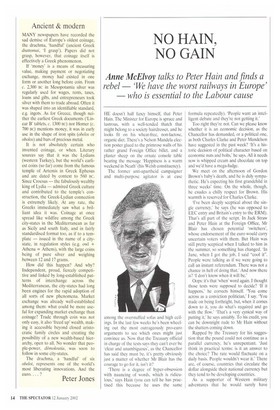Ancient & modern
MANY newspapers have recorded the sad demise of Europe's oldest coinage. the drachma, 'handful' (ancient Greek drattomai, 'I grasp'). Papers did not grasp, however, that coinage itself is effectively a Greek phenomenon.
If 'money' is a means of measuring value, making payment or negotiating exchange, money had existed in one form or another long before coin, From c. 2,300 BC in Mesopotamia silver was regularly used for wages, rents, taxes, loans and gifts, and entrepreneurs took silver with them to trade abroad. Often it was shaped into an identifiable standard, e.g. ingots. As for Greece, though neither the earliest Greek documents ('Linear B' tablets, c. 1300 BC) nor Homer (c. 700 BC) mentions money, it was in early use in the shape of iron spits (obelos or °bolos) and bars of precious metal.
It is not absolutely certain who invented coinage, or when. Literary sources say that it was the Lydians (western Turkey), but the world's earliest coins (so far) come from the famous temple of Artemis in Greek Ephesus and are dated by context to 560 BC. Since Croesus — the fabulously wealthy king of Lydia — admired Greek culture and contributed to the temple's construction, the Greek-Lydian connection is extremely likely. At any rate, the Greeks immediately saw what a brilliant idea it was. Coinage at once spread like wildfire among the Greek city-states in the Mediterranean as far as Sicily and south Italy, and in fairly standardised format too, as if to a template — issued in the name of a citystate, in regulation styles (e.g. owl + Athena = Athens), with the large coins being of pure silver and weighing between 12 and 17 grams.
How did this happen? And why? Independent, proud, fiercely competitive and linked by long-established patterns of interchange across the Mediterranean, the city-states had long been engines for the rapid adoption of all sorts of new phenomena. Market exchange was already well-established among them: what could be more useful for expanding market exchange than coinage? Trade through coin was not only easy, it also 'freed up' wealth, making it accessible beyond closed aristocratic family circles and creating the possibility of a new wealth-based hierarchy, open to all. No wonder that people-power, demokratia, was soon to follow in some city-states.
The drachma, a 'handful' of six obeloi, represents one of the world's most liberating innovations. And the euro. . . ?
Peter Jones


























































 Previous page
Previous page